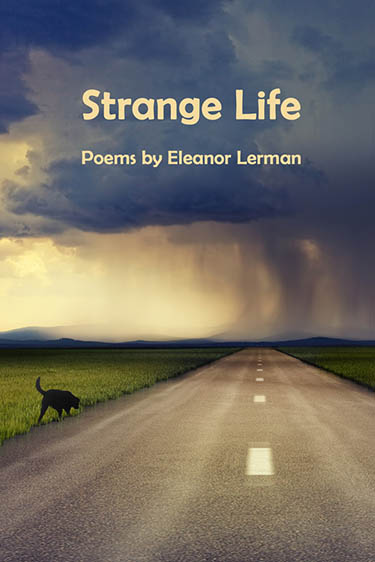STRANGE LIFE, a book of poems by GUGGENHEIM AWARD-WINNER, ELEANOR LERMAN
 STRANGE LIFE
STRANGE LIFE
by Eleanor Lerman
Mayapple Press, 2014
81 pp.
Award-winning poet, Eleanor Lerman, has the gift of writing such intimate poetry that it feels confessional, even though she never gives us personal information. That’s because her poems are about all of our private selves—the stranger inside us who will try anything, go anywhere, to find our place in this world and the next. In Ask Ed About the Coral Castle, Lerman comes right out with one of her essential questions. Where, you ask, where do you fit in? In Date Night in America, someone whispers, Where do you fit in? In Anonymous, “After all/ we have always been “the other.”
Strange Life is the journey of an ironic seeker who consorts with Carlos, a Nagual (Carlos Casteneda)—a human with the power to turn himself into a donkey or turkey, or, something sexier, like a puma or jaguar. The journey will take you to Virginia Beach, to the Edgar Cayce Institute “where it is promised that / All Questions Will Be Answered.” The seeker will make art and parade the artworks around, causing “the soft brown mountains where the spirits live” to write a letter that says, “they felt even more magical than they had in the old days.”
Sometimes Strange Life comes close to speculative fiction. We Have Our Dogs and Their Ancestral Blessings prepares us to survive the world’s end. And there are times that plain old good advice is sprinkled into the esoteric. And yet every poem, no matter how far out it goes, remains grounded in the everyday. In Dreamland the question is posed, “So how can it be avoided, the juxtaposition / of the household and the eternal.” Lerman’s language is full of contrasts. Who would expect to find “fanged revenant” and “the real deal” in the same poem?
Having had to memorize Joyce Kilmer’s Trees in elementary school, and always ending up the one who had to recite the line, “Upon whose bosom snow has lain,” I have never been a fan of personification, but Lerman use of this tool has won me over. Everything is alive in her poems where a raincoat can give an embrace and time sits on the couch beside you, looking heavy and dumb and the wind carries songbirds and bends the reeds in the lonely marshes.
It feels as if Lerman could give a terrific course called Science for Poets. Her poem, The Crab Nebulae, sent me to Google. Without reading her poem, I may never have known that when a star dies a violent and fiery death, it spews its innards out across the sky, creating an expanding wave of gas. And I was inspired to read about the Marfa Lights from one of her poems, ghostly lights, will o’wisps, that have been seen near U.S. Route 67 in Marfa, Texas that some believe are U.F.O’s, others the reflection of highway lights. Whatever you believe, this phenomenon makes a perfect foil for Lerman’s out-there imagination. And the title poem led me to learn about “the blue hour,” the time of twilight each morning and evening when there is neither full sunlight nor complete darkness, a time so prized by photographers that they call it “sweet light.” You can see that sweet light shape the landscape of Lerman’s poem.
I found myself as thrilled as a kid on a treasure hunt when I came across references that set off bells in my head. In the Nature and Attributes of God, I found “and starve / with the best of our generation.” (Hello, Ginsberg.) Heartbreak begins “You are not a hotel…” (Elvis Lives.) And I got to find out that Endymion was a mortal who fell in love with the moon.
For all the wit, there’s an underlying urgency to this collection. Lerman, like a soothsayer, a prophet, a rabble rouser, encourages us to start our own revolution if there isn’t one out there that fits us. Her poem, Deadpan, is a cautionary tale of what happens when we try to force ourselves into a life that doesn’t sustain us. She encourages us to support each other, to kiss the stranger. And Lerman sprinkles in good advice for anyone getting overly worried about what others think of us. “Think about satellites drifting out / of orbit hello, hello, as they wander / through the starry void.”